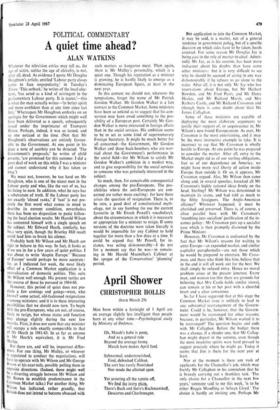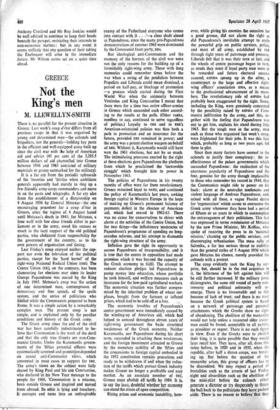A quiet time ahead?
POLITICAL COMMENTARY ALAN WATKINS
Whatever the television critics may tell us, the age of satire, unlike the age of chivalry, is not, after all, dead. As evidence I quote Mr Douglas Houghton's article, entitled 'Labour party closes ranks to face unpopularity,' in Tuesday's Tunes. 'This setback,' he writes of the local elec- tions, 'has acted-as a kind of astringent in the parliamentary Labour party. It is tauter,'—this is what the man actually writes-1n better spirit and more confident than at any time since last July.' Whereupon Mr Houghton embarks on an apologia for the Government which might well
have been delivered as a speech, subsequently issued under the imprimatur of Transport House. Perhaps, indeed, it was so issued, and no one noticed at the time. (Not that Mr Houghton's observations are entirely favour- able to the Government. At one point in his piece a note of acerbity can be detected. 'The Government's proposals,' he writes of child poverty, 'are promised for this summer. I did a great deal of work on this while I was a minister and cannot understand why it has taken so long.') We must not, however, be too hard on Mr Houghton, who is one of the nicest men in the Labour party and who, like the rest of us, has his living to earn. In addition, what he says has a substratum of truth. If the Labour party has not exactly 'closed ranks,' if 'taut' is not pre- cisely the first word what comes to mind to describe its current condition, nevertheless there has been no disposition to panic follow- ing the local election results. Mr Harold Wilson has contented himself with a single speech on the subject. Mr Edward Heath, similarly, has been very quiet, though the Brierley Hill result could lead him to break his silence.
Probably both Mr Wilson and Mr Heath are right to behave in this way. In fact, it looks as if we are in for a few years of quiet politics. I was about to write 'despite Europe.' Because of Europe' would perhaps be more accurate: for, as I indicated last week, the most likely effect of a Common Market application is a neutralisation of domestic politics. This suits Mr Wilson well enough. His present tactics are the reverse of those he pursued in 1964-66.
However, this period of quiet does not pre- clude a few comings and goings—even, who knows? some actual, old-fashioned resignations —among ministers; and it is to these interesting Possibilities that we should now turn. To begin With the pro-Europeans, who are not, of course, likely to resign, but whose status and function may change slightly during the next few months. First, it does not seem that any minister will occupy a role exactly comparable to that of Mr Heath in 1961-63. In so far as anyone is Mr Heath's equivalent, it is Mr Fred MuIley.
But there are, and will be, important differ- ences. For one thing, Mr Mulley, or whoever is appointed to conduct the negotiations, will have to operate with Mr Wilson and Mr George Brown at his coat-tails, possibly pulling them in opposite directions. (Indeed, there might- -well be a diverting struggle between Mr Wilson and Mr Brown to establish predominance in the Common Market talks.) For another thing, Mr Wilson his indicated, rather grandly, that Britain does not intend to become obsessed with
such matters as kangaroo meat. Then again, there is Mr Mulley's personality, which is a quiet one. Though his reputation as a minister is growing, he is hardly likely to emerge as a dominating European figure, at least in the next year.
In this context we should not, whatever the temptations, forget the name of Mr Patrick Gordon Walker. Mr Gordon Walker is a late convert to the Common Market. Some ministers have been so unkind as to suggest that his con- version may have owed something to the pos- sibility of a European post. Certainly Mr Gor- don Walker is more interested in foreign affairs than in the social services. His ambition seems to be to act as some kind of supernumerary Foreign Secretary. It might be much better for all concerned—the Government, Mr Gordon Walker and those back-benchers who are wor- ried about the Government's performance in the social field—for Mr Wilson to satisfy Mr Gordon Walker's ambition in a modest way, and to give responsibility for the social services to someone who was genuinely interested in the subject.
So much, then, for conceivable consequential changes among the pro-Europeans. The pos- sibilities where the anti-Europeans are con- cerned are rather more exciting: for here there arises the question of resignation. There is, to be sure, a good deal of constitutional myth- ology, not to say humbug (to use the current favourite in Mr Enoch Powell's vocabulary), about the circumstances in which it is necessary or appropriate for a minister to resign. If some versions of the doctrine were taken literally it would be impossible for any Cabinet to hold together for more than a few days at a time. It could be argued that Mr Powell, for in- stance, was acting dishonourably—I do not for a moment say that he was—in remain- ing in Mr Harold Macmillan's Cabinet at the apogee of the Conservatives' planning' period. But application to join the Common Market, it may be said, is a matter, not of a general tendency in government policy, but of a specific decision on which sides have to be taken, heads counted. For some reason Mr Douglas Jay is being _cast in the role of martyr-in-chief. Admit- tedly Mr Jay, as is his custom, has been more indiscreet about his doubts than have some other ministers: but it is very difficult to see why he should be accused of acting in any way dishonourably if he refuses to go alone to the stake. After all, it is not only Mr Jay who has reservations about Europe, but Mr Herbert Bowden, and Mr Fred Peart, and Mr Denis Healey, and Mr Richard Marsh, and Mrs Barbara Castle, and Mr Richard Crossman and (though there is some doubt about this) Mr James Callaghan.
Some of these ministers are capable of.
deploying the most elaborate arguments to justify their support of, or acquiescence in, Mr Wilson's new-found Europeanism. As ever, Mr Crossman is the most entertaining, and it may be the most instructive example to take. It is incorrect to say that Mr Crossman is wholly hostile to Europe. At one point he was prepared to consider the matter. After all, entry to the Market might rid us of our sterling obligations, free us of our dependence on America; we might have more real liberty of action inside Europe than outside it. Or so, it appears, Mr Crossman argued. Alas, Mr Wilson then came along and, in several speeches, knocked all Mr Crossman's highly rational ideas firmly on the head. Sterling? Mr Wilson was determined to maintain its status, and had told as much to the filthy foreigners. The Anglo-American alliance? Whatever happened, it must be cherished and preserved. There is, of course, a close parallel here with Mr Crossman's 'stumbling into socialism' justification of the in- comes policy : Mr Crossman puts up a socialist case which is then promptly disowned by the Prime Minister.
However, Mr Crossman is undaunted by the fact that Mr Wilson's reasons for waiting to enter Europe—an expanded market, and similar capitalist paraphernalia—are not those which he would be prepared to entertain. Mr Cross- man, and those who think like him, believe that in the end it will all work out for the best. We shall simply be refused entry. Hence no moral problem arises at the present juncture. Every man, and woman too (for there are grounds for believing that Mrs Castle holds similar views), can remain at his or her post with a cheerful heart and a clear conscience.
So far I have suggested that at this stage the Common Market issue is unlikely to lead to any substantial rearrangement of the Govern- ment. Could it be, however, that the Govern- ment would be rearranged for other reasons; because, in particular, Mr Wilson wanted it to be rearranged? The question begins and ends with Mr Callaghan. Before the budget there was a chance, if a slender one, that Mr Callag- han might depart in the autumn, even though the most inventive spirits were hard pressed to suggest precisely where he might go. Today it seems that Jim is there for the next year at least.
Nor at the moment is there any rush of applicants for the Chancellor's job, which may fortify MT Callaghan in his conviction that he is bravely carrying out a thankless task. 'The only choice for a Chancellor in the next few years,' someone said to me this week, 'is to he either Reggie Maudling or Selwyn Lloyd.' The choice is hardly an inviting one. Perhaps Mr Anthony Crosland and Mr Roy Jenkins would be well advised to continue to keep their heads beneath the parapet, restricting their interests to non-economic matters: but in any event it seems unlikely that any question of their taking the Exchequer will arise in the immediate future. Mr Wilson seems set on a quiet time ahead.







































 Previous page
Previous page